Vladivostok: Where Cultures Collide
- Aaron Schorr
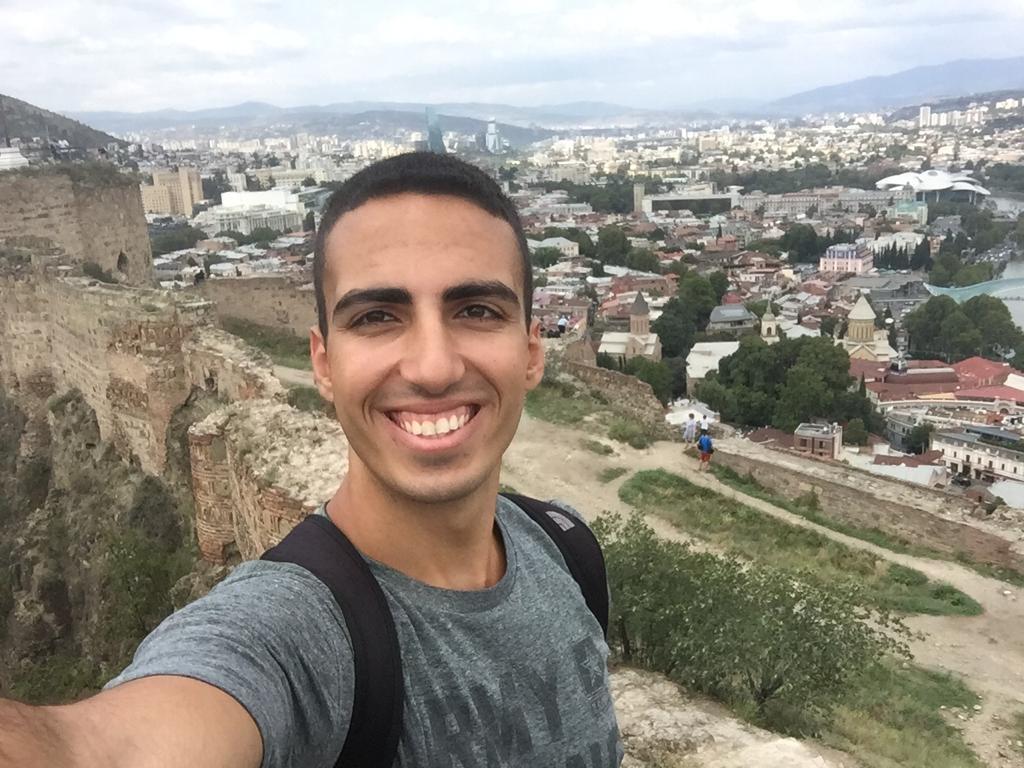
- Mar 21, 2020
- 16 min read
Updated: Mar 29, 2020
The nearly-empty flight from Narita to Vladivostok lasted less than two hours, but we might as well have been traveling halfway across the world and several decades back in time. Descending below the thick clouds stretching past the horizon, the landscape was suddenly entirely in shades of brown and white, with icy rivers visible here and there. A Soviet air-search radar was positioned by the runway, providing the perfect setting for arriving in Russia. I had long been fascinated by Russia, a country that seemed to be a riddle and a tragedy, a unique paradox among nations. I intended to travel the vast Russian periphery of the Far East and Siberia by train, dip south to explore some of the Central Asian republics, and then return to western Russia in late spring, which was more urbanized, European, and developed. In doing this, I hoped to capture some of the spirit of 21st-century Russia and gain more insight into this unique country, its past, and its present.

"What Will You Do in Russia for a Whole Month?!"
We were rather apprehensive after landing, unsure whether we would encounter difficulties due to our recent travel history to Japan and Taiwan or some new travel restrictions not published online. The aircraft came to a stop and an official wearing a red suit with a Russian eagle patch sewn on his sleeve boarded to take passengers' temperature with an infrared camera. Stinking of sweat, he barely gave us a glance before continuing down the aisle.
Arriving at passport control, I put on my friendliest smile and approached the window. My Israeli passport produced some confused looks, the official summoning several colleagues who all wanted a look at it.
"What is the purpose of your visit to Russia?"
"Tourism."
"How long do you plan to stay?"
"Around one month."
"One month?! What will you do in Russia for a whole month?"
"Erm... I'm taking the train and then going to Kazakhstan."
The woman shrugged and pulled out an official-looking document, assumingly checking the rules for Israeli visitors. After consulting her supervisor, my passport was stamped and I was handed a slip of paper called an immigration card. "Don't lose this," was the stern accompanying warning, "you need it to leave". Yes, ma'am. Evidently there was nothing wrong with wanting to travel in Russia for long periods of time, even if they all seemed confused by my presence.
The first order of business was to get a local SIM card from a small stand in the terminal advertising them. For the abysmal price of ₱500 ($7), we could get unlimited data for two weeks. And what if we wanted three weeks? The vendor seemed confused; evidently none of the Chinese, Korean, or Japanese tourists who normally make up the overwhelming majority of tourists here stay that long. It turned out two weeks, three weeks, and a month were all the same price, but the card would be activated for different periods of time, prompting some serious head-scratching. Welcome to Russia.
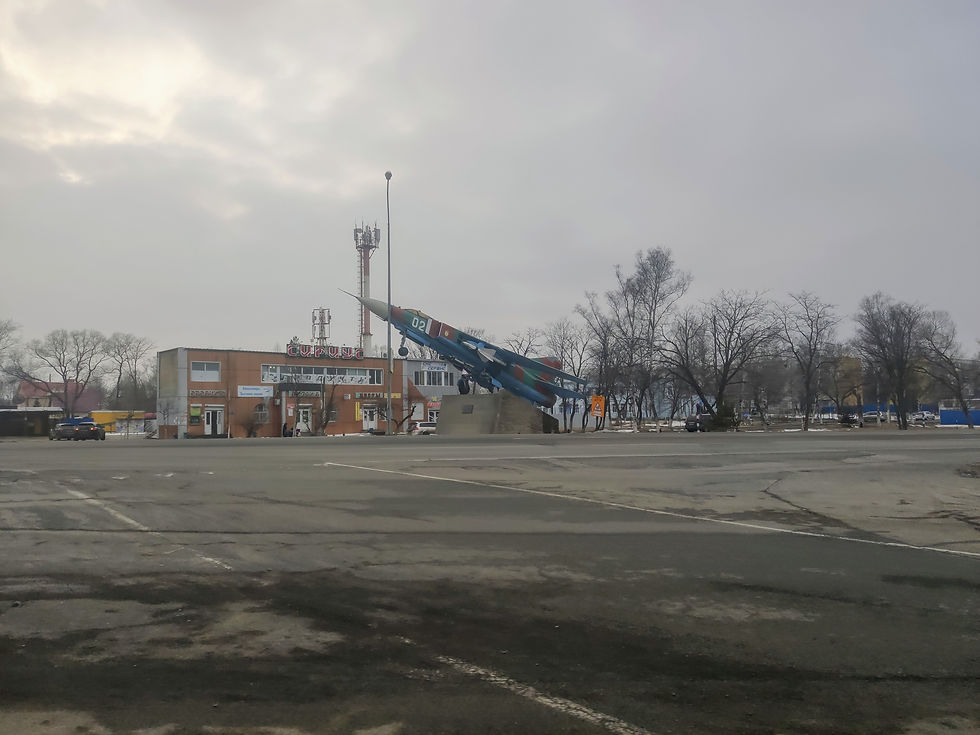
Stepping out of the terminal, we were immediately hit by the cold. It was around freezing, with grey skies and a brisk wind, a far cry from the sunny 22° it had been in Taipei only that morning. The airport bus, which was really a van with a number on it, took us into Vladivostok through the suburbs of Artem and Trudovoye, dirty, industrial places that looked like they hadn't changed in 40 years, except for the addition of American fast food restaurants.
The first thing I noticed was how dirty all the cars were. Many of the side streets were unpaved or in bad condition, and months of dirty snow had taken their toll on nearly every vehicle. The van stopped and I found myself looking at the words "Vokzal Vladivostok" (Vladivostok Station), the eastern terminus of the Trans-Siberian Railroad. A tremor of excitement ran through me. Vladivostok had been on my list for years, but I hadn't expected to visit so soon.
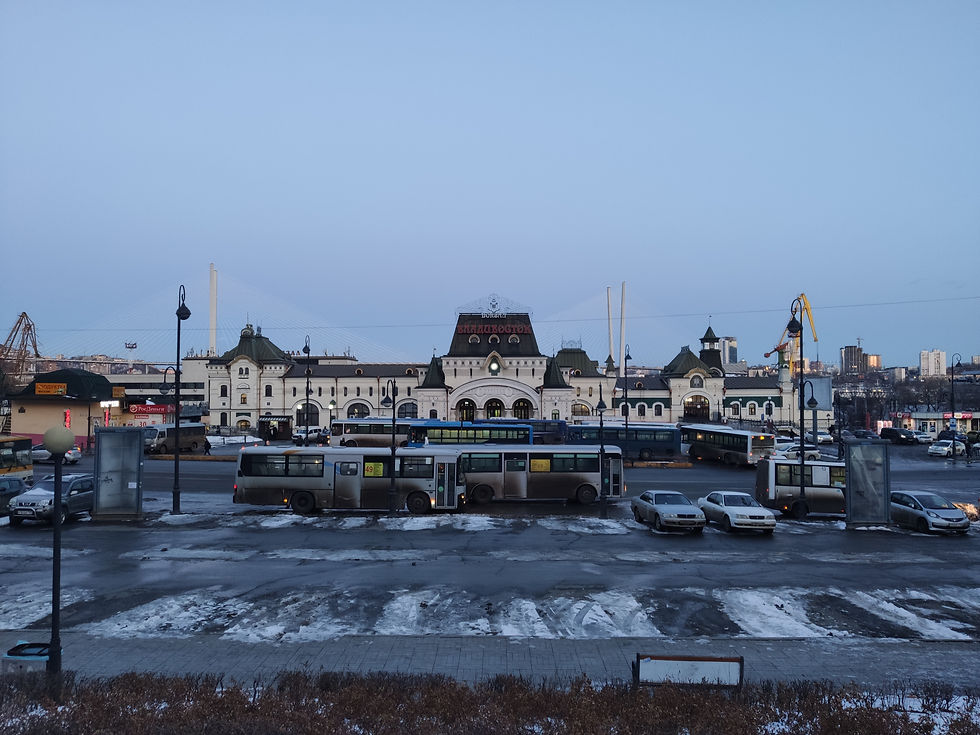
The term "hostel" means different things in different parts of the world. In Russia, as in Germany, for example, it just means a cheap place to stay, providing decent service with no frills. This means that Russian hostels host all sorts of people, with a large proportion of domestic guests, a far cry from the social backpacker stomping grounds I had come to love in other countries. We were the only foreign guests in our hostel, which was really just a converted apartment. With nobody human to consult, Google gave us some ideas for places to get dinner.
It was March 8th, International Women's Day, which is apparently a huge deal in Russia. More precisely, it's a day where men take their girlfriends and wives out to dinner, meaning the top-rated restaurants were all fully booked. We found space in perhaps the most male-oriented establishment around, an American-style bar specializing in craft beer and homemade sausages. Not the most authentic first meal in Russia, but it did the job, though it, too, had more than a few celebrating couples.
Ice Fishermen and Anti-Aircraft Cannons
The next day was devoted to exploring the city. We headed west, aiming for a historic fortress commanding the old part of the city, but got distracted by what seemed to be a frozen lake. The visibility was terrible, but we could see lots of fishermen in cold-weather gear out on the ice. They would drill two holes in the ice and dangle a fishing rod down each one, waiting for nibbles. I walked up to one, wanting to ask if I could take a picture of him.
"Dobroe utro," I said, good morning.
"Nyet."
Off to a fabulous start interacting with the locals, though a profession as rough as this must attract a certain type of person. The next fisherman was much nicer, however, smiling and agreeing to a photo. We were like two kids, excited by the novelty of this strange frozen landscape, compounded by the discovery that it wasn't a lake at all, but a small inlet on the Bay of Amur, which leads to the Pacific.

Above us on a hill, commanding a view of both the bay and the natural harbor which was the initial reason for the city's establishment, was an old fortress, built to protect the port from foreign invaders as Russia fortified its position in the Far East in the 19th century. We paid the ₱200 ($3) entry fee and climbed up the stairs to a large courtyard full of military hardware. It was like a playground for me, the swings and slides replaced by artillery and anti-aircraft guns. Particularly fun was a tremendous 57mm Soviet anti-aircraft cannon in use by several Middle Eastern militaries which could be elevated and rotated; my old commanders would be jealous.
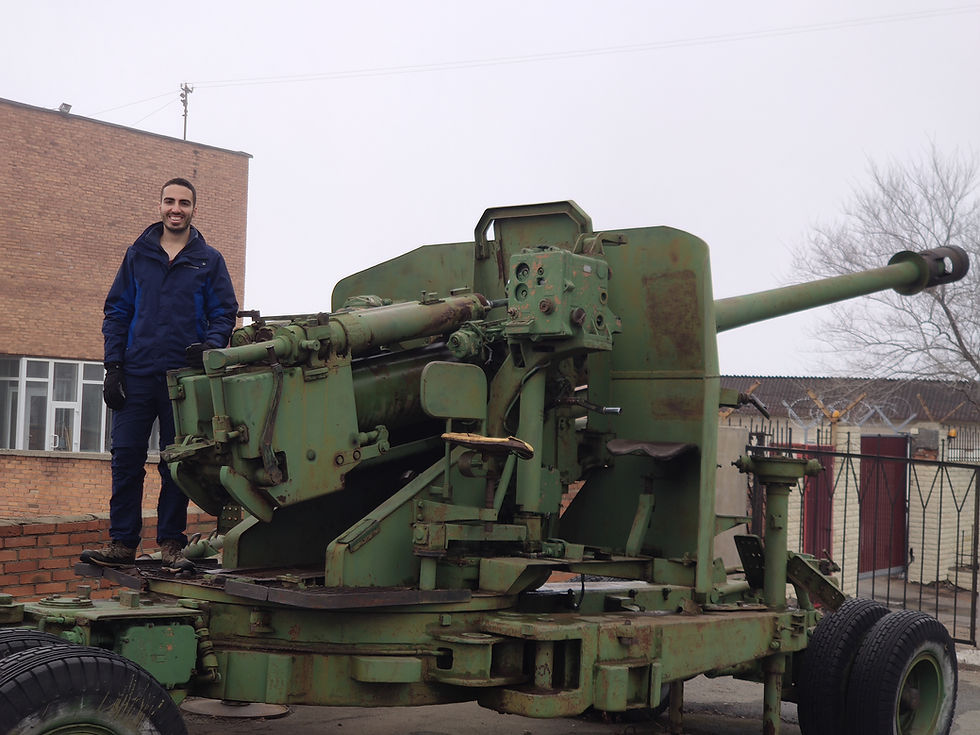
The next item on my list was just as unusual. In an effort to obtain foreign currency, the North Korean government opened a chain of cash-only restaurants in cities frequented by North Korean businessmen, primarily in China and Russia. Interested in all things North Korea but lacking plans to visit it anytime soon, I had intended to visit one of the restaurants in China. With my travel plans changed, I was happy to learn Vladivostok had one of its own.
We walked down the coast of the bay to Pyongyang Café, the entrance guarded by two statues of Buddha. On the way, we passed a swimming pool cut out of the frozen bay, where a local was toweling off after finishing an icy dip. Our first day in Russia was reaffirming one stereotype after another and I was loving it.
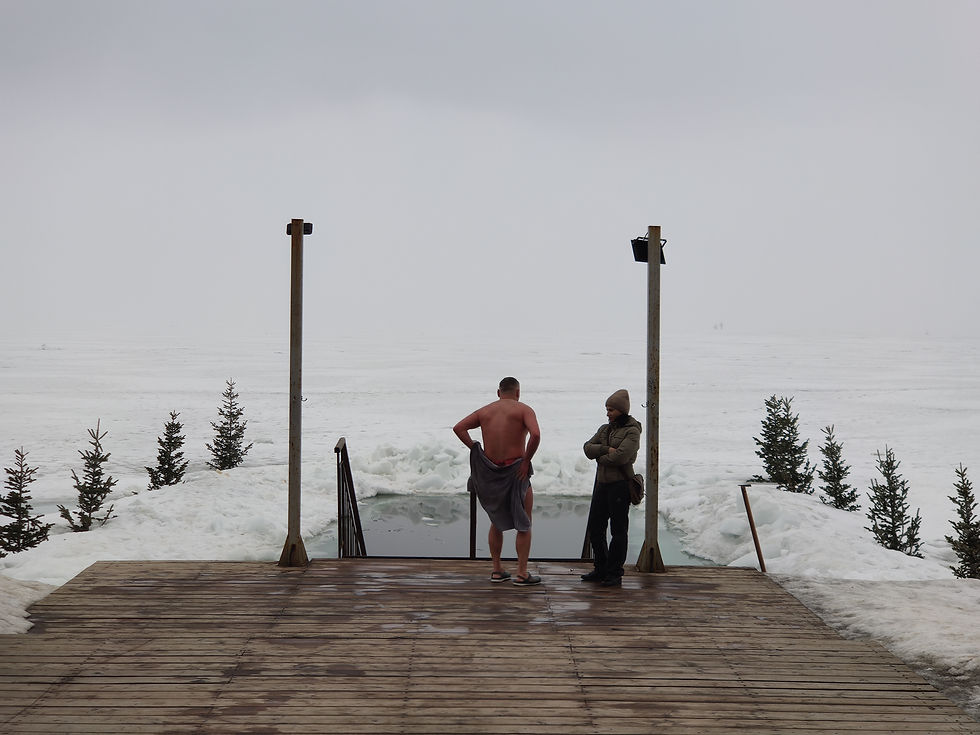
Entering the North Korean restaurant, you walk into an small foyer decorated almost like a rainforest, with sounds of chirping birds and vines hanging from the ceiling to match. It seemed only around half the female wait staff was Korean (though everyone spoke perfect and, as far as I could tell, unaccented Russian), further differentiated by wearing traditional Korean robes. Guests are greeted politely at the door and the cash-only policy is clarified.

The menu was extensive, seemingly a blend of what a homesick Korean might want to eat and what Russians like to eat (sushi and lots of grilled meat). We ordered a rice- and kimchi-heavy assortment of Korean dishes, which were all good but nothing incredible. To be honest, the whole experience did nothing to suggest the unique identity of the restaurant's owners, and disappointed me by not having a single North Korean product on the menu - even the beer was either Chinese or South Korean. Only later did I learn that the waitresses put on a show every evening, which gives me me something to go back for.

The North Korean influence got me thinking about Vladivostok's unusual geographic situation. The city is a full 4,000 miles away from Moscow, with China and North Korea both right around the corner, in Russian terms at least. Actually, if I counted correctly, 32 other national capitals are closer to Vladivostok than its own capital city, including places as far-flung as Kabul, Afghanistan, Palikir, Micronesia, and Port Moresby, Papua New Guinea. The city was built by Russians in the 19th century but has has evolved with a pronounced Asian flair, further strengthened by the large numbers of Chinese, Korean, and Japanese visitors it receives. These were mostly gone now, but their influence remained. The city hardly has any Russian restaurants, their popularity surpassed by those offering Oriental cuisine, and every magazin produkty (general store) is full of Korean snacks and Chinese microwave dinners.
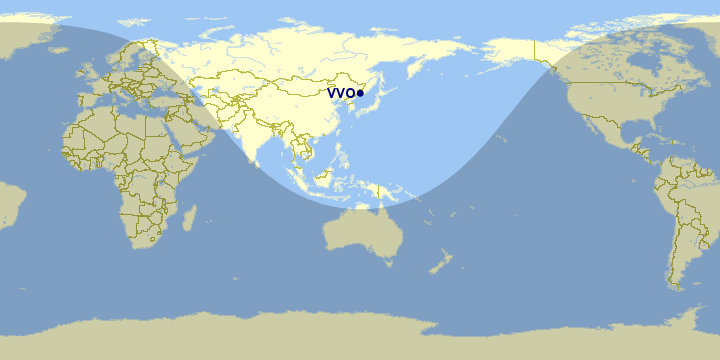
The other notable East Asian influence is the cars. Due to some mechanism I have yet to understand, Japanese cars are somehow cheaper to import across the former Soviet Union than European ones. By Japanese cars I don't just mean any old Toyota or Honda, I mean cars produced for the Japanese market itself. This has resulted in left-hand drive cars (with the driver sitting on the right) filling the roads of a number of right-hand drive countries, a phenomenon I first witnessed in Georgia and Abkhazia, but I suspect there is nowhere it's more pronounced than Vladivostok. The roads may be designed for right-hand traffic, but it seems only around every fifth car has the driver seated on the correct (left) side. Incredibly, I even saw a police car with the wheel on the right, a unique oddity confined to this corner of the world and undoubtedly the cause of many a road accident.
Friendly Locals, At Last
I had been reading a lot of recommendations for the Russian Couchsurfing community, so I decided to revive my old account. Pretty quickly, I found a local named Vladimir who wanted to show us around town in the evening. We met him and he introduced us to stolovayas, a kind of Soviet-style cafeteria selling traditional Russian food for really low prices. This was my first proper Russian meal so I went all in, filling my tray with liver Stroganoff, grecha (buckwheat), and potatoes with a glass of kompot to wash it down. Vladimir said the place was fairly expensive, but the ₱205 ($3) I paid seemed to say otherwise.
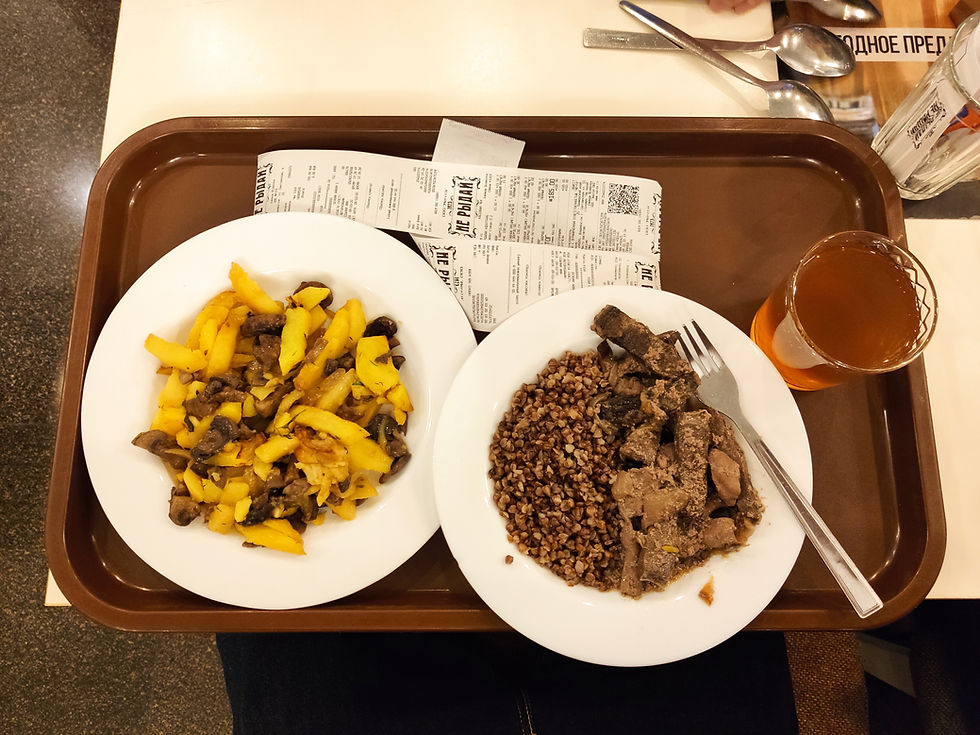
Our stomachs full, Vladimir said he wanted to take us to a secret spot with a view of the city. We walked past an apartment complex, up some stairs, and started climbing a narrow, icy path over stones and loose concrete. Vladimir had come prepared, offering us a headlamp; I was glad I was wearing my hiking boots. The path flattened out and the city lights were visible below, glittering in the clear night.
With the fog gone, blown away by an icy wind, we got our first proper view of the two gargantuan bridges that have become the defining feature of the Vladivostok skyline. The first is the Zolotoy Bridge, crossing the harbor to connect the city center with Pervomayski District to its south, and the second continues south across the so-called "Eastern Bosphorus" to connect the same district with Russky Island. Both bridges were put up in 2011 ahead of the Asia-Pacific Economic Cooperation conference hosted in the city, and both have had a profound impact on it. Before the bridges, Vladimir tells us, Pervomayski was a huge "ghetto" and Russky was wilderness; today, the former is integrated into the city and the latter has been "settled", even sporting a new federal university. It's a great example of the impact good infrastructure can have on people's lives and a rare case of successful large-scale public works investment in today's Russia, where such products are usually hampered by corruption scandals and often never completed.
Island
We carefully climbed down and walked along the waterfront, past the northern end of the Zolotoy Bridge. This area had been a huge drydock in the Soviet era, one of the main maintenance points for the Red Navy. Some of the drydock remained, now owned by Russian energy corporation Rosneft, but much of the waterfront remains deserted and undeveloped. It could have been a lovely spot, if there were anything but a paved boardwalk and some old brick warehouses. We said our goodbyes to Vladimir and went to sleep, exhausted by the cold and the walking.

Russky Island: The Ends of the Earth
We woke up to fresh snow which was still coming down. The plan was to explore the southern part of Russky Island, which seemed beautiful and wild, and we hoped the weather would cooperate. There was a bus running to the island from the city center, another van with a number in the windshield and a credit card terminal used for paying the flat ₱28 ($0.4) fare. One of many curiosities of Russian culture is that passengers always pay for the bus when getting off, so things can get rather slow when everyone pays by credit card.
The bus crossed both bridges and headed down Universitetskiy Prospekt, the new avenue crossing the island from north to south. We were supposed to get off at the southern end, but the driver didn't stop, as we had evidently not given him the appropriate signal. The avenue came to an abrupt end and the bus turned onto a bumpy road, equal parts ice and potholes, with thick forest on both sides. The next stop was a few kilometers ahead, in a small, nameless village. This time, I told the driver we wanted to get off well in advance, and we simply crossed the street to the opposite bus stop. Fortunately, a bus arrived after a short wait, this one a larger noisy Korean relic.
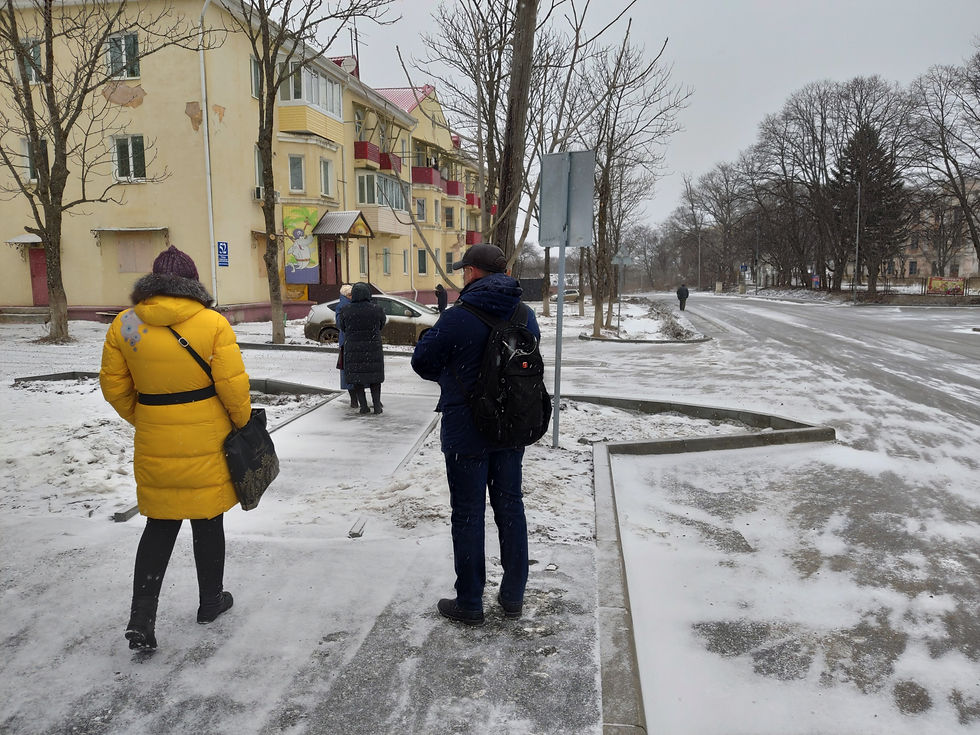
We got off at the right place this time and started down a path by the side of the road. We got an express introduction to hiking in ice and snow, something I hadn't done since visiting Antarctica 9 years ago and was totally new to Yotam. This was the coldest day in a couple weeks, with temperatures around -3°, so there were layers of ice of various consistencies beneath the recent snowfall. The flat, white ice, as we very quickly learned, was brittle and usually hid unfrozen water. Stepping on it would cause the ice to crack with a sound like a Pringle being eaten and our boots to plunge into the frigid water below. Clear ice was usually very slippery; the best surface was snow or rough ice mixed with rocks.

We hiked down a peninsula called Mys Vyatlina, the snow and tree cover both getting thicker as we got closer to the ocean. The wind really picked up as we reached the southern tip, with great views of the ocean beneath the white cliffs we were standing on. Luckily, there was a long-abandoned building nearby that offered shelter for a brief rest.

Our goal was the tip of the next peninsula to the west, where there was supposedly a picturesque lighthouse. Navigating was difficult, as Google Maps was missing most of the paths and operating my phone required taking off at least one glove in the freezing wind, so we tried sticking to the path closest to the sea to loop around the small bay formed by both peninsulas. This worked for a while, until reaching the top of a hill with the unlikely name of Schmidt, where the trail completed a full 360° around the hilltop and promptly ended. The cell reception was too weak to get a satellite map of the area, but I managed to find our way to the correct trail, a serene path covered with undisturbed snow leading through a thick forest, like something straight out of a Christmas movie.

Passing a frozen beach, we reached the northern head of the next peninsula, where we found a strange concrete structure looking like a large bunker, with two large tunnels leading around 10 meters into the hillside and a narrow passage connecting them. We had no idea what purpose the structure served, but it provided a welcome respite from the wind. Others before us had clearly had the same idea, judging by the number of beer bottles on the concrete floor.

The southernmost part of the peninsula was almost an island, the two rocky high grounds connected by a narrow strip of rock almost at sea level. There was an old pillbox and ropes to climb the steep face of the southern tip, compounding the sense of adventure. A brief climb up a hill blanketed in weeds brought us to the "lighthouse", which in reality was just an iron observation tower, with narrow ladders to climb the 10 meters or so to the top for views of the ocean and the cliffs looming above it. It was a beautiful spot, feeling like the end of the world in the best possible sense.
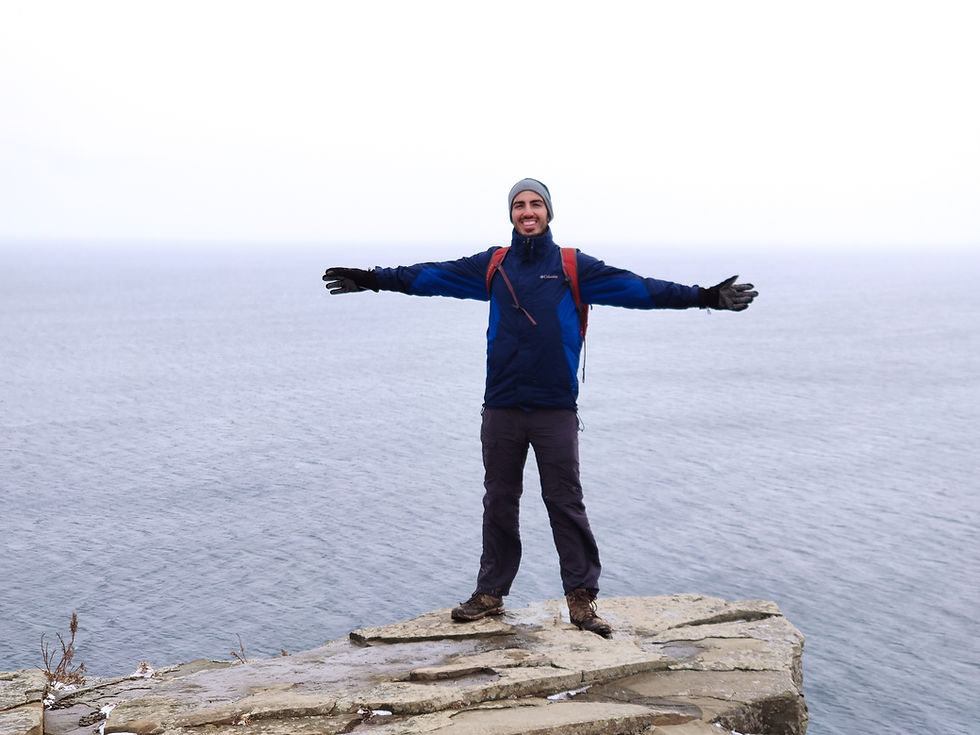
The trip back to the main road was quick and uneventful. The temperature had risen above freezing and turned much of the thinner ice to mud, which was at least as bad. I actually had to unzip my jacket and take off my glove liners, which would have been unthinkable only a few short hours ago. We came across a group of people, the first we had seen in hours, producing a mixture of friendly greetings and blank stares as we passed them. They had driven out in big SUVs which were now parked in the concrete tunnels, thus solving one mystery.
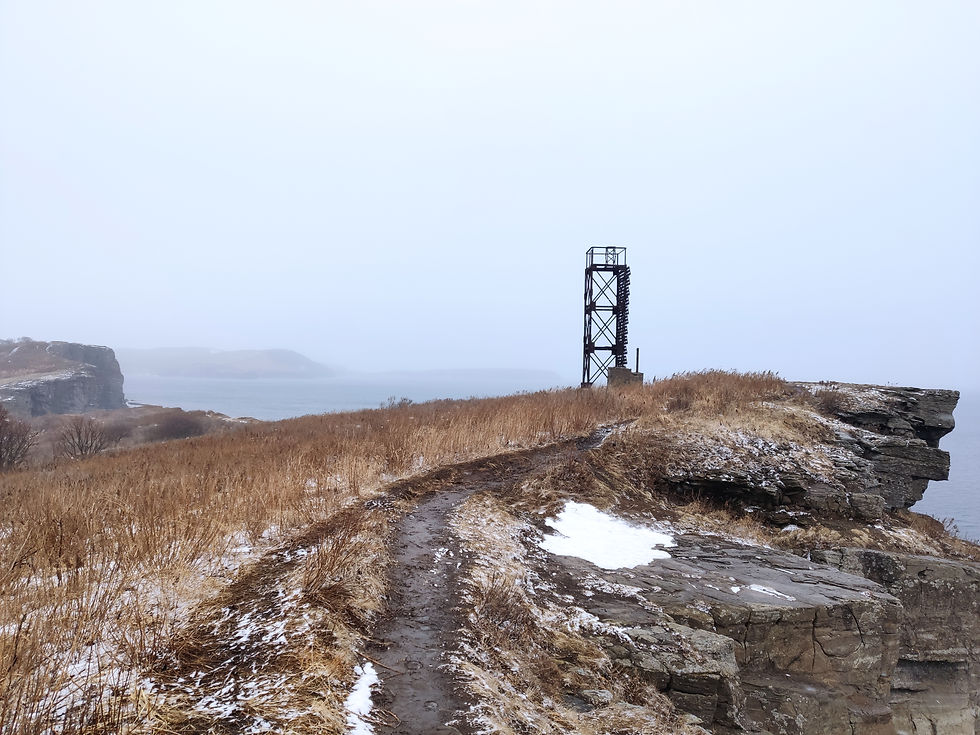
Stalin's Unique Genius
Back in the city after a particularly cramped bus ride, during which I learned it was perfectly acceptable in Russia for people to simply shove their way past other passengers to get off, we packed up our things and left the hostel. If we weren't going to meet people there, I figured we might as well stay with locals and found a Couchsurfing host in the downtown. He wasn't going to be home for the next few days, but his flatmate Igor would look after us. We got off to a good start after Igor sent us to get dinner at a nearby Georgian restaurant, which had khinkali (steamed dumplings) that were as good as any restaurant in Georgia.
Over mugs of black tea in his very Soviet kitchen, Igor turned out to be an unforgettable character. He could hardly stop talking, full criticism of Russian society and stories of his self-titled "adventures" in Vladivostok, usually involving copious amounts of alcohol and women from out of town. Stalin, according to him, was undeniably evil but belonged to a class of people possessing a "unique genius", which enabled him to shape Russia's destiny and turn it into a global power. Modern Russian society was still very much influenced by Stalin but had "lost its way", feeding on cheap lies and refusing to see the bigger picture. Russian women, on the other hand, were "unambitious" and "boring", possessing no moral virtue, no values beyond the Instagram models they were all trying to emulate. It was a fascinating conversation, continuing long after Yotam had gone to sleep.
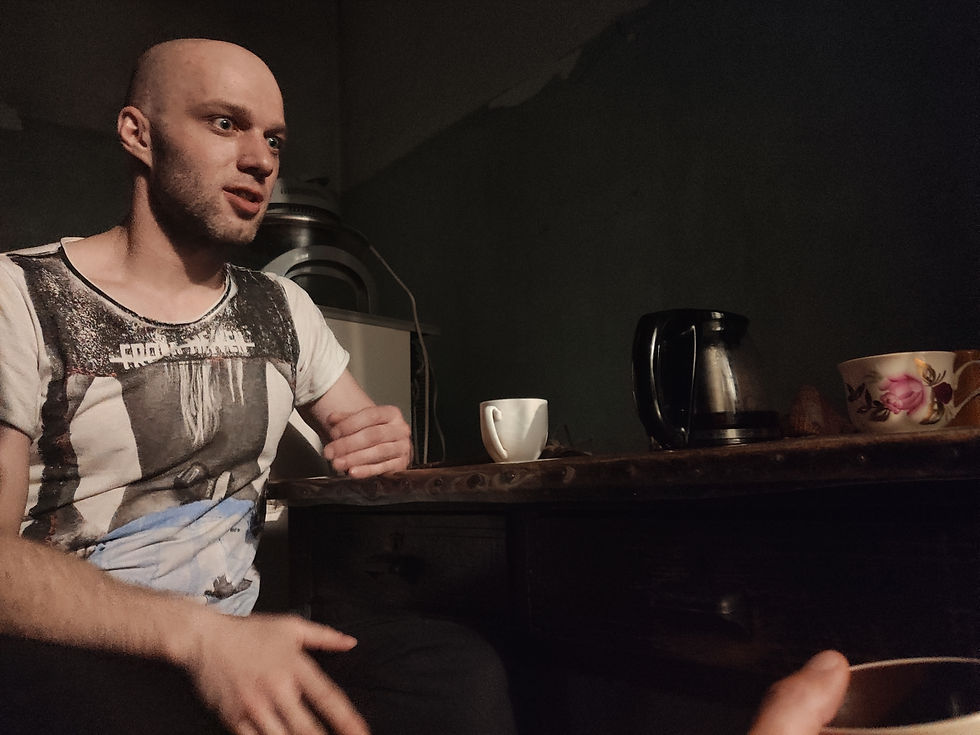
Nikita, our actual host, had served in the Russian Navy and there was a 6' high Russian naval ensign hanging above his bed, which was definitely something I had never expected to find myself sleeping under.
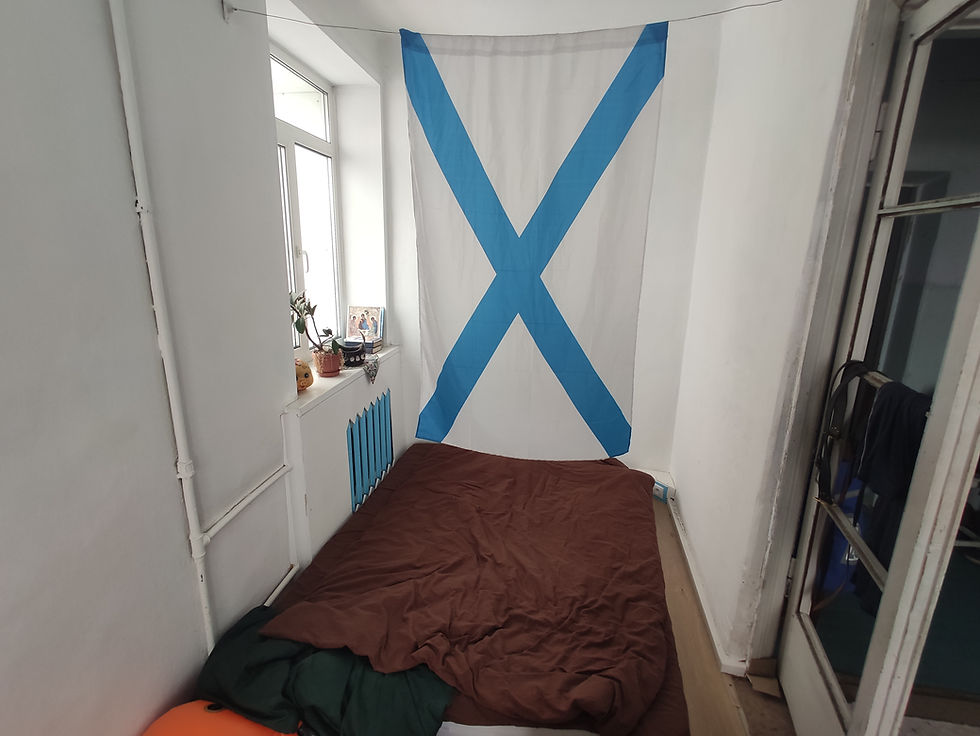
The older part of Vladivostok in which we were located was on yet another peninsula, at the tip of which was apparently a good banya, or traditional Russian bathhouse. We took a bus out there but couldn't find any sign of a banya. We were at a beach, with up to a solid foot of snow covering the lifeguard's post and the beach chairs, which made for a strange sight. The wind was gusting at 50 km/h and we ducked behind a wooden outhouse to get our bearings out of the wind. The map revealed that there were two locations of the same name; the one we were looking for was obviously the other one, a kilometer and a half up the windy beach with no other option but to walk.

There was no way I was making it to the banya in one piece, but at least we were in a pretty spot.
There was a cute lighthouse (a real one, this time) a couple hundred meters out to sea, connected to land via a narrow strip of loose rocks. It was cold and windy walking but the sea views were nice, the Bay of Amur mostly frozen over with a narrow channel leading to the harbor, with the northern shore of Russky on the opposite shore.
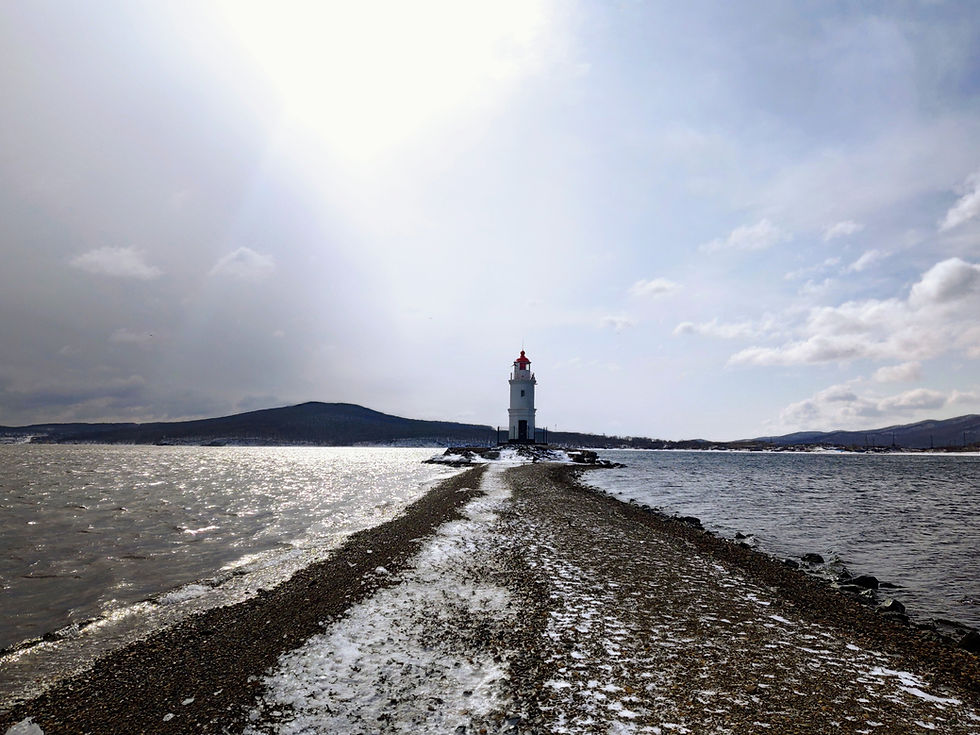
We were leaving town on the train that evening and wouldn't be in a city of any decent size until we reached Ulan-Ude several days later, which meant we needed to stock up on food for the train in Vladivostok if we wanted to have a variety of available products. We left the supermarket with two bags stuffed to the brim with food and snacks, costing perhaps a fifth of what a similar purchase would cost in Israel (more on that when I write about the actual train ride).
The Opening of the Closed City
Another local Couchsurfer had offered to show us around and we met up in the snowy main square, beneath a huge bronze monument dedicated to the "Fighters for the Power of the Soviets in the Far East, 1917-22", as the plaque read. The sun had come out, the first time we had seen it in Russia, and with the fresh snow the city looked lovely, almost cheerful even. Our guide was Elena, a bubbly woman in an iridescent jacket who set off to show us the city with the clipped precision of a Russian tour guide. We followed a similar route to the one we had done with Vladimir, though it looked quite different in daylight. She was excited to meet people from Israel for the first time and asked lots of questions about Judaism, which she was evidently rather familiar with. Why do so many Jews have German surnames? What is the purpose of the long hair on the sides of Jewish men's heads? Are Jews really good at business or is that just a myth? Antisemitism, it seemed, had come full circle in some parts of Russian society.

Talking with Elena gave me a sense of how much the city had changed in the last 30 years. The large naval base had made Vladivostok a "closed city" in Soviet times, one of several dozen areas of military significance inaccessible to residents of other parts of the USSR and entirely off-limits to foreigners. In stark contrast, Elena told me stories of American sailors she had met on their visits to the city to commemorate V-E Day, and here I was, an American roaming freely and taking pictures of the headquarters of the Pacific Fleet, which would have sounded ludicrous only a generation ago. Vladivostok's many hills had even earned it the nickname "the San Francisco of Russia" among locals, which was absolutely hilarious to me.
We walked back along Svetlanskaya Avenue, parallel to the waterfront, which I had taken to calling "Monument Way". Monuments are an inherent part of any city formerly behind the Iron Curtain, but this was the highest concentration I had seen in my life. Within 300 meters, and I'm trying to translate these directly to the best of my abilities, one passes monuments dedicated to the VS Oshepkov, Russia's first submarine, the explorers of the Far East, the Russian heroes of the 1904-5 Russo-Japanese War, the victims of the Pacific Fleet in WWII, Tsar Nicholas II, the pioneers of scuba diving in the Pacific, the Tsarist Pacific Fleet, the city's first settlers, the "City of Military Glory", and of course the main square (see above). It's a confusing jumble of genres, eras, and political systems, but it's a mirror image of the factors that have shaped Russian identity since the fall of the Soviet Union.

Elena took us to an interesting restaurant fusing Russian and Asian cuisine. We had green tea pelmeni (typical Russian dumplings) and schnitzel with a Japanese sauce, a good summary for our last meal in this hybrid city blending Eastern Europe and East Asia.

After taking pictures together, we gathered our things, said goodbye to Elena and Igor, and departed for the station to the setting of a spectacular sunset, the first I had seen in weeks. Next up: some very long train rides.






Comentarios